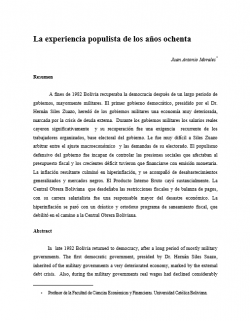The populist experience of the eighties
DOI:
https://doi.org/10.35319/lajed.200912161Keywords:
Bolivia, Debt problems, Economic populism, Crisis, InflationAbstract
In late 1982 Bolivia returned to democracy, after a long period of mostly military governments. The first democratic government, presided by Dr. Hernán Siles Suazo, inherited of the military governments a very deteriorated economy, marked by the external debt crisis. Also, during the military governments real wages had declined considerably and organized labor, which was the main political support of the democratic government, fought very forcefully for their recovery. Siles Zuazo found very difficult to reconcile macroeconomic adjustment with the demands of his electorate. The government’s defensive populism was unable to cope with the mounting social pressures that worsened the fiscal deficits: These deficits were financed printing money. The resulting inflation, which ended up in a hyperinflation, was moreover accompanied by food shortages and black markets. GDP fell substantially. The Central Confederation of Workers, disdainful of fiscal and balance of payments constraints, embarked itself in a wage race, which over time became a major culprit of the economic disaster. The hyperinflation was stopped with a drastic and orthodox program of stabilization, with the side effect of weakening politically the organizations of workers.
Downloads
References
Alesina, A., y Rodrik, D. (1992) “Distribution, Political Conflict and Economic Growth: A Simple Theory and Some Empirical Evidence” en Cukierman, A., Hercowitz, Z. y Leiderman, L. (compiladores) Political Economy, Growth, and Business Cycles. Cambridge, MA: The MIT Press. pp 23-50.
Dornbusch, R. y Edwards, S. (1991) “The Macroeconomics of Populism” en Dornbusch, R. y Edwards, S (compiladores) The Macroeconomics of Populism in Latin America. Chicago: The University of Chicago Press. pp 7-14.
Kaufman, R.R. y Stallings, B. (1991) “The Political Economy of Latin American Populism” en Dornbusch, R. y Edwards, S (compiladores) The Macroeconomics of Populism in Latin America. Chicago: The University of Chicago Press. pp 15-34.
Hirshman, A. (1981). Essays in Trespassing. Cambridge. Cambridge University Press.
Morales, J.A. (1988) “Inflation Stabilization In Bolivia” en Bruno, M., Di Tella, G., Dornbusch, R. y Fischer, S. (compiladores) Inflation Stabilization Cambridge, MA: The MIT Press.
Morales, J.A. y Sachs, J.D. (1990). “Bolivia’s Economic Crisis” en J.D. Sachs (compilador) Developing Country Debt and Economic Performance. Chicago: The University of Chicago Press.
Sachs, J. (1987). "The Bolivian Hyperinflation and Stabilization". American Economic Review 77, No. 2, pp. 279-283
Sachs, J. (1989) “Social conflict and populist policies in Latin America.” NBER Working Paper No 2897. Cambridge, MA. (marzo).
Woodford, M., (2001) “Fiscal Requirements for Price Stability,” Journal of Money, Credit, and Banking, Vol. 33(3), pp. 669–728. (agosto).






